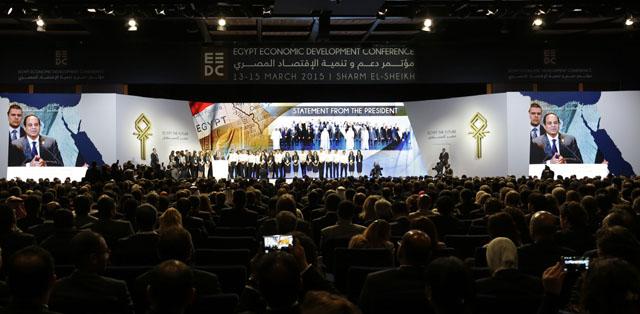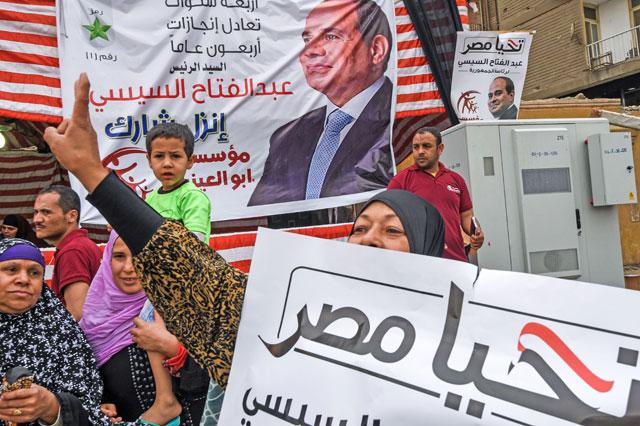You are here
Sisi rides high after investment summit, but the hard part only beginning for Egypt
By Reuters - Mar 15,2015 - Last updated at Mar 15,2015

SHARM EL SHEIKH, Egypt — President Abdel Fattah Al Sisi was so confident after Egypt signed billions of dollars of deals at an investment summit that he publicly joked on Sunday about haggling with the world's top chief executives. Yet the real challenge has only just begun.
"To Egyptian and international partners, if you really want to contribute to developing this country, you must work night and day and, as for the cost, please give us a break," he said in his closing speech at the Sharm El Sheikh resort, to applause and laughter.
Corporate giants such as General Electric, Siemens and BP signed major deals, Gulf Arab allies pledged $12.5 billion and top Western officials provided political support for the man who ousted Egypt's first freely elected president. Egypt's prime minister said deals worth a total of $36 billion were signed at the summit.
Sisi is riding a wave of nationalism, with Egyptians betting he can deliver stability and economic growth with a series of mega-projects such as an expanded Suez Canal.
During his speech, he was flanked by young Egyptians taking "selfies" with the former army chief.
At times Sisi had to ask his supporters to stop cheering so he could speak. Many foreign businessmen and bankers attending were impressed.
"What I can gather from this is the momentum behind this president is extraordinary," said Alex Thursby, chief executive officer of Abu Dhabi National Bank.
But difficult times still lie ahead in a country where more than half the population live below the poverty line.
Egypt's economy is only just starting to recover from political upheaval triggered by the 2011 uprising that ended the 30-year rule of Hosni Mubarak and will require a lot more than populism to prosper.
"Egypt needs at least $200-$300 billion to [develop]... I know Egypt and its problems," Sisi said.
With the high-profile, glitzy three-day summit in Sharm El Sheikh, Egypt aimed to send a clear message that it is serious about reforming the economy and creating big opportunities for investors.
Foreign investment
A celebratory mood dominated the conference, with one of its highlights a party hosted by billionaire businessman Naguib Sawiris and a famous Lebanese pop singer.
Cairo wants to double foreign investment in this fiscal year to $8 billion, despite an Islamist insurgency in northern Sinai and frequent militant attacks across the country.
Sawiris, one of Egypt's top businessmen, said it was high time for the government to fire inefficient members of the bureaucracy, about 7 million civil servants who eat up 25 per cent of the budget.
"Bureaucracy and corruption are married. You end bureaucracy, you kill corruption," he told Reuters in an interview.
Sherif El Helw, the managing director of Akanar Partners, an Egyptian investment firm that advised the government on investment strategies, said an original list of 120 proposals had been whittled down to 22 for the economic summit.
He questioned the wisdom of mega-projects such as the Suez Canal at the heart of Sisi's agenda.
"I think smaller projects, a realistic project that can be completed in short periods of time, these are what the economy needs today," he added.
One of the most ambitious projects is a new administrative capital with a price tag of $45 billion located east of Cairo. It is scheduled to be built in five to seven years.
Separately, new Tourism Minister Khaled Ramy said on Sunday in an interview that Cairo hopes to generate $20 billion in revenue from tourism by 2020 by attracting 20 million visitors.
An uprising that toppled Mubarak four years ago hit the economy hard, discouraging investors and tourists and slashing economic growth. Egypt hopes the conference will project an image of stability and help attract billions of dollars.
Ramy told Reuters that the goal was part of strategic plans that include creating two new resorts through nearly $1 billion of investment over five years and hiring a private company to run a three-year advertising campaign.
He said he wanted to counteract the negative news of the last few years which has hampered tourism, a major source of revenue and foreign reserves for Egypt.
More than 14.7 million tourists visited Egypt in 2010, dropping to 9.8 million in 2011. They rose the following year to 11.5 million but shrank back to about 10 million last year.
Ramy said he expected numbers to grow by 15 per cent this year.
"The message is right on my face: it's 7 o'clock in the morning and we already have this beautiful sunshine here in Sharm El Sheikh," he said in a poolside interview at a luxury hotel.
Ramy, 56, was appointed minister this month in a Cabinet reshuffle.
He added that Egypt was on track to have enough hotel rooms to accommodate 20 million tourists, but needed investment in restaurants and shopping malls.
Egypt will seek investment for two new investment projects, Ramy said: an 8-million-square-metre resort on the Red Sea worth 5 billion Egyptian pounds and a 1-million-square-metre resort on the Mediterranean worth £2.5 billion.
Ramy added that the ministry would use its $40 million a year marketing budget to contract a global advertising campaign this summer.
Security is a concern for tourists in Egypt, which is facing an Islamist insurgency based in the northern Sinai that has launched small bombing attacks across the country. Blasts usually target security forces but more recently have hit civilian targets such as restaurants and stores.
Asked what the government was doing to secure tourists, Ramy pointed to heavy security for the weekend conference.
"As you have seen here in Sharm El Sheikh, I don't think even a rat from the desert could come in and do anything," he said.
Security has been tight during the three-day event, attended by kings, heads of state and top officials including US Secretary of State John Kerry.
Checkpoints on major roads are manned by machine-gun wielding soldiers in combat gear, while military helicopters buzz overhead. Plainclothes police line more isolated desert roads.
In an another interview, Sawiris said he was ready to invest $500 million in Egypt and was diversifying his telecoms business into infrastructure, energy and transportation, sectors which need major funds in the country.
Sawiris, a billionaire from a powerful Coptic Christian family, said the investment conference in the Red Sea resort had been a success but that the government would need to make efforts to follow up with investors.
"We all know the minute the decisions go down to our famous and most regarded bureaucrats you see one sign only: stop. They need to have a pusher, and the minister of investment is a pusher," said Sawiris, 60, chairman and chief executive of Orascom Telecom, Media and Technology.
He emphasised that the government should form a committee to firmly thrust the investment agenda forward and help revive Egypt's economy, laid low by four years of political turmoil triggered by the 2011 revolt.
"My advice... is the prime minister should initiate a small office headed by the investment minister with some drivers who continue the dialogue with the investors who committed to the projects in this conference," added Sawiris.
Egypt clinched investments worth billions of dollars from top global companies such as General Electric, BP and Eni at the conference, which ends on Sunday.
Gulf Arab allies also pledged $12.5 billion.
Sawiris said Orascom Telecom would diversify into new sectors including infrastructure, logistics and energy projects alongside its core business.
"I am going to be extremely aggressive here in my investments. We have firepower right now of $500 million. Today we signed $100 million out of this 500," Sawiris told Reuters in the interview at the investment conference. "We are the first and the only Egyptian company till now to sign the solar power energy 50 megawatts today."
Sawiris also saw opportunities in Tunisia.
"We are willing to duplicate our investments in Egypt in Tunisia, because it's stable, because the political Islamists are more wise than ours here," he said.
Sawiris said Egyptians had set aside concerns over human rights, which he described as "not ideal", to focus on the economy, but stressed Egyptians should not abandon hopes generated by the 2011 uprising.
"We will concede to the will of the people that we need to build the country first, but once the country stands on its feet, we will not accept less than a true, total, liberal, democratic [society]," said Sawiris, founder of the liberal Free Egyptians Party.
Turning to one of the most sensitive issues in Egypt, Sawiris was adamant that the military should not have a role in the economy.
The armed forces said to control up to 40 per cent of the economy. Sisi told Reuters last year it was more like 2 per cent.
"It distracts the main focus because we are under a lot of threats. They will not like what I say now but that's my opinion," said Sawiris. "An army should focus one and only task and that is defending Egypt. Where else in the world do other armies have businesses?"
Related Articles
Cairo — Egyptian billionaire Naguib Sawiris has offered to buy an island off Greece or Italy and develop it to help hundreds of thousands of
SHARM EL SHEIKH, Egypt — Egypt is promoting itself as a linchpin for intra-African trade and a model of economic reform as it
CAIRO, Egypt — Critics see him as an autocrat. The poor and middle class criticise his economic reforms.

















